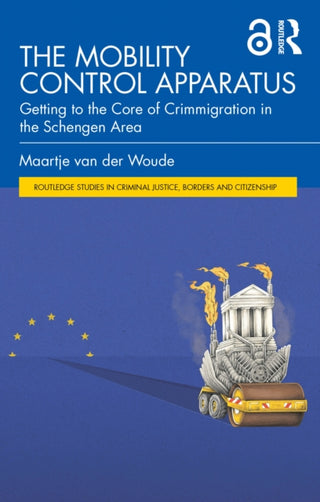-
This book critically explores the complexities of intra-Schengen border control and migration dynamics within Europe. It provides a comprehensive analysis of how various actors, including border officials and state apparatuses, interact in managing mobility and enforcing controls. The theoretical foundation draws on Foucaults concept of the dispositif, examining how borders are enforced through a combination of legal frameworks, discourses, and on-the-ground practices. The book emphasizes the importance of discretion in border control, arguing that it plays a pivotal role in shaping decisions at both the organizational and street levels. It delves into the experiences of Dutch border control officers and the wider European context, offering a comparative analysis of Poland and Germany's intra-Schengen borderlands. By drawing on real-world case studies, it showcases the tensions between security and mobility, and how migration is managed through both visible and covert policing practices. The work is grounded in rich qualitative data, collected over years of fieldwork, and addresses key debates in migration and criminology studies, particularly the evolving concept of "crimmigration" and its implications for human rights and security policies. This book will be of interest to criminologists, sociologists, legal scholars, and political scientists alike, as well as all those engaged in studies on migration, mobility and the European Union.
This book critically explores the complexities of intra-Schengen border control and migration dynamics within Europe. It provides a comprehensive analysis of how various actors, including border officials and state apparatuses, interact in managing mobility and enforcing controls. The theoretical foundation draws on Foucaults concept of the dispositif, examining how borders are enforced through a combination of legal frameworks, discourses, and on-the-ground practices.
The book emphasizes the importance of discretion in border control, arguing that it plays a pivotal role in shaping decisions at both the organizational and street levels. It delves into the experiences of Dutch border control officers and the wider European context, offering a comparative analysis of Poland and Germany's intra-Schengen borderlands. By drawing on real-world case studies, it showcases the tensions between security and mobility, and how migration is managed through both visible and covert policing practices. The work is grounded in rich qualitative data, collected over years of fieldwork, and addresses key debates in migration and criminology studies, particularly the evolving concept of "crimmigration" and its implications for human rights and security policies.
This book will be of interest to criminologists, sociologists, legal scholars, and political scientists alike, as well as all those engaged in studies on migration, mobility and the European Union.

